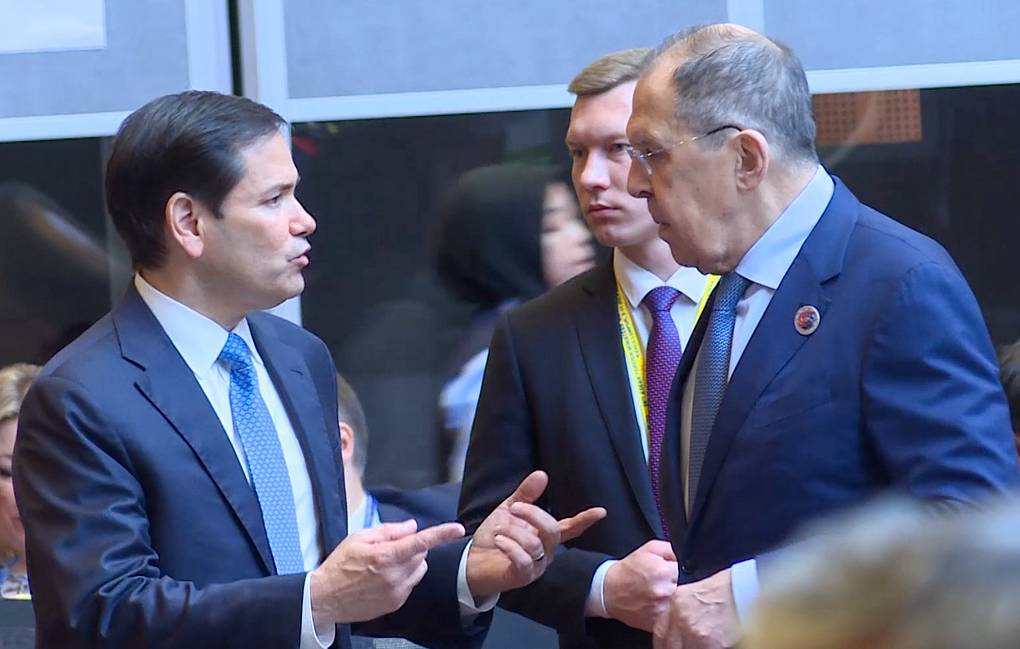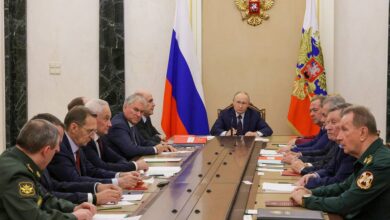Press review: Lavrov, Rubio meet again as EU parliament blocks motion on von der Leyen
Top stories from the Russian press on Friday, July 11th US Secretary of State Marco Rubio and Russian Foreign Minister Sergey Lavrov
US Secretary of State Marco Rubio and Russian Foreign Minister Sergey Lavrov
MOSCOW, July 11. /TASS/. Russian Foreign Minister Sergey Lavrov met with his US counterpart Marco Rubio, meanwhile Donald Trump introduced new tariffs, and Ursula von der Leyen weathered a no-confidence motion. These stories topped Friday's headlines across Russia.
Vedomosti: Results of second meeting between top Russian, US diplomats
A second in-person meeting between US Secretary of State Marco Rubio and Russian Foreign Minister Sergey Lavrov after February 18 in Riyadh took place on July 10. It was held on the sidelines of the ASEAN Summit in Malaysia’s Kuala Lumpur and lasted almost 50 minutes.
Lavrov, Rubio highlight importance of normalizing operation of diplomatic missions
Following the meeting, Rubio, reiterating US President Donald Trump, expressed displeasure with the course of talks on settling the Ukraine conflict. However, he emphasized that the conversation was important and sincere while he discussed several ideas with his Russian colleague, including those related to "a different approach" for Moscow in settling the crisis.
The Russian Foreign Ministry reported the talks’ results in a statement on its website. In particular, the two officials "reaffirmed mutual commitment to searching for peaceful solutions to conflict situations and resuming Russian-US economic and humanitarian cooperation and unhindered ties between their countries’ societies."
When trying to guess what Rubio meant by "a different approach," then formally this may be, for example, the content of Russia’s draft memorandum submitted to Ukraine last month, said Nikolay Silayev, senior research fellow at the Institute for International Studies of MGIMO University.
"Lavrov and Rubio have not met since the last round of the Istanbul talks. And in Kuala Lumpur, they quite possibly could have discussed the Russian draft memorandum in person," the expert said.
The meeting between Lavrov and Rubio is important but hardly decisive, Silayev added. With this meeting, the US confirmed that it is interested in continuing talks with Russia, even though it does not want to facilitate the Kiev regime fulfilling the terms put forth by Moscow. "Main events are unfolding at the frontline, while decisive meetings between diplomats are still ahead," he concluded.
Izvestia: Why Trump introduced tariffs on copper
By imposing tariffs on countries in the Middle East and North Africa, Donald Trump is pursuing two major objectives — to expand the US’ leverage in these regions and eliminate competitors in oil production, experts polled by Izvestia believe. This is necessary to protect local producers. That said, the potential resulting economic damage of Algeria, Tunisia and Iraq can be estimated at $10-15 billion this year. The American leader also announced a 50% tariff on copper imports into the country. Its prices have already jumped by 17%. This metal is particularly important for producing various types of weaponry, such as airplanes, ships, and ammunition. Russia ranks seventh in the world in copper production.
-
Despite insignificant trade with these countries, the region itself, the Middle East and North Africa, is important, because Washington seeks to increase its presence there, said Maxim Chirkov, associate professor at the Institute of Economics and Finance of the State University of Management.
That said, by doing so, the US administration is trying to eliminate its competitors in oil production, believes Yulia Davydova, associate professor of the Department of Political Analysis and Socio-Psychological Processes, director of the Center for Socio-Political Studies at Plekhanov Russian University of Economics. She reiterated that Algeria, Libya and Iraq are global suppliers of oil and petroleum products.
Donald Trump seeks to play against the oil market, thereby pushing these countries to abandon participation in OPEC+ and production reduction programs in order to further bring down prices, said Mikhail Khachaturian, associate professor at the Department of Strategic and Innovative Development at the Financial University. According to independent expert Andrey Barkhota, cheaper oil, which will flow to US manufacturing plants, will help curb the manufacturers’ rising costs of finished products in the process of American reindustrialization. This, in turn, will support local oil companies. Even though by July, Brent quotations regained some of their losses (on July 9, it was trading at $69.5 per barrel), overall, energy prices have fallen by a quarter since the beginning of the year.
"The estimated losses of Algeria, Tunisia and Iraq from the tariffs can be estimated at $10-15 billion this year. But most likely, these countries will try to reach an agreement on mutual trade with the US by reducing their own levies on American goods," Khachaturian added.
Trump chose copper for a reason — the United States ranks second in the world in terms of copper ore reserves, but there are not many developed deposits in the country, said Davydova. According to her, the high tariffs will encourage domestic copper production and return the US to its dominant position in this field.
"Trump's idea is to stimulate the domestic production of strategically important metals. However, it is important to remember that incentives are a long process, while the needs of the industry already exist. Additional metal will not appear from the thin air, it must be imported. Therefore, American consumers will either pay extra or reduce their copper usage," said Alexey Kalachev, an analyst at Finam.
Russia is a major producer of copper, with reserves of about 930,000 tons, noted Khachaturian. This is the seventh place in the world. However, due to sanctions, copper exports to the United States are not being carried out, so the duties will not affect Russia, he added. Currently, the Russian Federation is more focused on the supply of copper concentrate to China, which is geographically justified, added Kalachev.
Izvestia: European Parliament rejects no-confidence vote against von der Leyen
On July 10, the European Parliament rejected a vote of no confidence in European Commission (EC) President Ursula von der Leyen. The lack of unanimity on this issue does not mean that delegates will not try to hold a vote again or submit it to other EC members, Izvestia learned. 360 out of 553 deputies opposed her dismissal, but the vote’s lobbyists claim that they received more votes in support than they could even imagine.
Von der Leyen survives confidence vote as dissent surprises Brussels
Tomas Zdechovsky, a member of the European Parliament, told Izvestia that in the future, new attempts to initiate a no-confidence vote cannot be ruled out, especially if concerns about governance, transparency or ethical issues persist. According to him, even though a collective no-confidence vote is directed against the entire European Commission, individual members can also be held responsible through various mechanisms, including hearings, calls for resignation, or pressure from political groups and national governments. However, this rarely happens and is politically delicate, so it requires significant consensus in Parliament.
A vote of no confidence is always passed to the entire European Commission, not just to its head, since all its decisions are made collectively, Fernand Kartheiser, a delegate from Luxembourg, told Izvestia. The politician was among those who supported the decision to declare a no-confidence vote to von der Leyen.
According to him, because EU High Representative for Foreign Affairs and Security Policy, Kaja Kallas, is also a member of the commission, the vote also involves her and another attempt is likely.
Given that right-wing parties have more than a third of the votes and seats in the European Parliament, the result was quite obvious, political analyst Alexander Rahr believes.
In his opinion, this is not a split, but just the reflection of different factions and forces in this parliament. The expert noted that the very fact that there was such an attempt to distrust von der Leyen at all is still a blow to her reputation and authority.
Nezavisimaya Gazeta: Armenian, Azerbaijani leaders hold constructive talks with no breakthroughs
First direct top-level talks between Armenia and Azerbaijan were held in the United Arab Emirates (UAE). Earlier, the two leaders only interacted at various international summits. The sides were discussing the signing of a peace treaty agreed back in March for five hours. Even though no notable practical results were achieved, the meeting was considered useful.
Director of the Armenian branch of the Institute of CIS Countries Alexander Markarov has not ruled out that the meeting in the UAE took place due to the US’ involvement. "State Department head Marco Rubio supported the signing of a peace treaty between Armenia and Azerbaijan. Rumors are that the US wants to take control over the Zangezur Corridor and Armenia’s authorities are not against this," the expert told the newspaper.
Markarov also noted that Armenian Prime Minister Nikol Pashinyan’s government is ready to sign the peace treaty coordinated earlier, but Azerbaijan’s degree of interest is still unclear.
However, he does not believe that the talks in the UAE were unsuccessful. On the contrary, if the two sides spoke for five hours without interpreters, this means that they had things to discuss thoroughly.
Farhad Mammadov, director of the Center for South Caucasus Studies, noted: "Both sides emphasized that not only did they exchange views but also held constructive discussions. This means that they want to resolve certain longstanding issues."
Vedomosti: Bitcoin price reaches new records
This week, the price of Bitcoin climbed to new highs. At Binance, the world’s largest cryptocurrency market, the rate surpassed $116,000 overnight on July 11. Bitcoin’s last historic peak was clocked at the end of May 2025 when its price surpassed $111,000.
Bitcoin rises to new all-time high topping $116,000
Bitcoin’s surge over the last couple of days is the result of several fundamental factors. Among those, cryptocurrency market analyst Viktor Pershikov highlights the stable inflow of liquidity to the market via crypto ETFs, expectations of relaxed monetary policy by the US Federal Reserve as well as substantial demand for Bitcoin at OTC trading platforms and on the part of major institutional players. He added that another prominent factor this year has been the rise of Bitcoin purchases for the reserves of listed companies from the world’s leading economies, which testifies to stable demand for crypto assets.
If no negative triggers emerge, Bitcoin stands a good chance of staying above $110,000 and continuing its incremental climb, said Tehnobit Director General Alexander Peresichan. In the future, if there are no major sales and market players remain positive, Bitcoin can test the levels in the range of $120,000, possibly before the end of July and more likely by the end of August, the expert noted.

